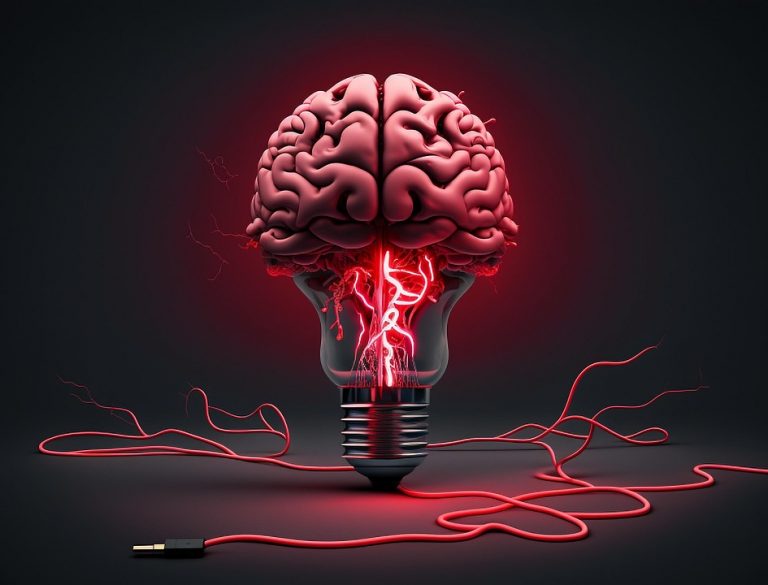Brain calming tea is a simple ritual with outsized benefits: a blend of herbs and mindful minutes that quiets the noise in your head and sharpens the part of you that gets things done. If your attention drifts, your to-do list grows, and your patience thins, this is the kind of help that works without a lecture. Here I’ll show you seven clear, science-backed ways a cup can lift your focus — and how to make those benefits stick in your life.
Contents
How Brain Calming Tea Sharpens Focus
A good cup of brain calming tea calms the limbic system — the part of your brain that hijacks attention when you’re stressed — while supporting neurotransmitters tied to concentration. Clinical research on key ingredients such as L-theanine, chamomile, and lemon balm shows they reduce cortisol, increase alpha brain waves, and improve working memory and attention span. Read the NIH summary on herbal calmers for a quick review of the evidence to trust.
When stress drops, you stop fighting yourself. The energy you once spent worrying shifts into thinking clearly. That’s not fluff. It’s practical brain chemistry, and the ritual of pouring a cup signals your body and mind to prepare for focus.
Seven Ways Brain Calming Tea Boosts Focus
1. Lowers Stress Hormones And Clears Mental Clutter
Stress is a fog. Cortisol and adrenaline clamp down on the parts of your brain that plan and organize. Ingredients often found in brain calming tea like chamomile and lemon balm reduce cortisol levels and soothe the nervous system. University research on chamomile shows measurable reductions in anxiety symptoms, and clinical work on lemon balm links it to improved mood and attention.
Sit with your cup. Notice how breathing slows. Those two acts — lowering cortisol and slowing respiration — create mental space. That space is where concentration grows.
2. Increases Alpha Brain Wave Activity
Alpha waves are the brain’s “ready” state: relaxed but alert. L-theanine, found in tea leaves and included in many brain calming tea blends, promotes alpha activity. Scientists have recorded increases in alpha rhythms after L-theanine consumption, and those changes correlate with better focus and reduced distractibility.
You don’t need hours of meditation to reach that state. A 10–15 minute tea break can nudge your brain into alpha territory, giving you calm attention instead of jittery reactivity.
3. Supports Neurotransmitters That Aid Attention
Concentration depends on neurotransmitters like dopamine and GABA. Certain herbs in brain calming tea interact with these systems gently. For example, GABA-promoting herbs help the brain shift from hypervigilance to calm alertness, making it easier to sustain attention on tasks.
This is subtle, not chemical warfare. The herbs support balance — they make staying present less exhausting.
4. Creates A Repeatable Focus Ritual
Habit is the scaffolding of productivity. When you turn making brain calming tea into a ritual, you create a predictable mental cue that primes concentration. Rituals anchor the day; they tell your brain what to expect and when.
Pair your cup with a simple action: five deep breaths, a plan of three tasks, or a 25-minute focus block. The tea signals the start, and your brain learns to respond.
5. Reduces Cognitive Fatigue
Working hard taxes attention. Herbs with antioxidant and anti-inflammatory properties help reduce the physiological wear-and-tear that leads to mental fatigue. Evidence suggests that calming botanicals can lessen subjective fatigue and improve sustained attention.
When fatigue eases, your ability to scan, decide, and execute improves. A focused cup becomes a reset button for your thinking.
6. Encourages Mindful Pauses That Improve Productivity
Mindfulness is a muscle. A cup of brain calming tea gives you a portable practice: sip, breathe, notice. Those small pauses interrupt automatic thinking and let you re-align with whatever matters.
Even three mindful sips reduce reactivity. Over weeks, those pauses sharpen your capacity to return to focus after interruptions.
7. Enhances Sleep And Daytime Focus
Focus and sleep are bedmates. Poor sleep wrecks attention; good sleep restores it. Many ingredients in brain calming tea support sleep onset and quality — valerian, chamomile, and passionflower among them. Improved sleep produces better daytime alertness and clearer cognitive performance.
So a nightly cup can be an investment in tomorrow’s focus, not just tonight’s calm.
What To Look For In A Brain Calming Tea
Not every calming brew is created equal. Look for blends that include a balance of these proven ingredients: L-theanine (or green tea base), chamomile, lemon balm, lavender, passionflower, and optionally valerian for evening blends. Avoid heavy proprietary blends that hide ingredient amounts; transparency matters.
Quality matters too. Choose organically grown herbs when possible. Pesticides irritate the body and undermine the calming effect you want.
How To Brew For Maximum Focus
Timing and temperature matter. Use water just below boiling for green-tea–based blends and boiling for sturdy herbs like chamomile. Steep 5–10 minutes depending on the herb; longer for stronger extraction but not so long that bitterness creeps in.
Turn your brewing into a small ritual: set a timer, breathe deeply, plan three outcomes for your focus session. These tiny anchors compound.
How Often Should You Use Brain Calming Tea?
Daily use is safe for many people, but listen to your body. Two to three cups per day is common and often effective. For those taking medications, pregnant or nursing, or with chronic conditions, check with your clinician — many herbal effects are mild but not always advisable.
Rotate ingredients to avoid tolerance or overexposure and keep the ritual fresh.
Real-World Tips To Make The Most Of Your Cup
- Create a single-purpose tea cup just for focus sessions. The brain loves reliable cues.
- Pair tea with the Pomodoro technique: 25 minutes of work, five minutes of rest. Use tea to start the session.
- Keep a small focus journal. After your tea, write the one thing you must finish. That clarity turns calm into action.
- Blend your tea ritual with micro-meditation. Five mindful breaths after the first sip locks attention faster than caffeine alone.
These tactics turn passive sipping into an active performance tool.
Evidence And Expert Voices
Researchers at major institutions have mapped how L-theanine increases alpha waves and reduces stress markers, and clinical studies on chamomile and lemon balm show measurable benefits for anxiety and attention. Integrative medicine clinicians at university health centers often recommend herbal teas as adjuncts to therapy for anxiety and sleep, which indirectly supports better focus the next day.
I encourage you to read the NIH and university overviews on these herbs to see the science for yourself and to discuss options with your healthcare provider when you have health concerns.
Bottom Line
A thoughtful cup of brain calming tea is more than comfort. It’s a small, evidence-backed intervention that lowers stress, boosts the brain’s attention systems, and creates a reliable ritual that primes you for work. Use the right ingredients, brew with intention, and pair the cup with a focused habit. Do that, and you’ll watch your scattered minutes become purposeful hours.
Be kind to your mind. Make that cup count.
FAQ
Is brain calming tea the same as regular herbal tea?
No. A brain calming tea is formulated with ingredients chosen to reduce stress and support attention, like L-theanine, chamomile, and lemon balm, rather than general herbal blends meant purely for flavor or digestion.
Will brain calming tea make me drowsy during the day?
Most daytime blends are designed to promote calm alertness, not drowsiness. Evening blends with valerian or higher doses of passionflower are more likely to encourage sleep. Start with small doses to see how your body responds.
Can I replace my coffee with brain calming tea?
You can, but consider your goals. Coffee boosts alertness quickly; brain calming tea supports steady, sustained focus without jitter. Some people combine a small amount of caffeine with L-theanine for balanced energy.
Are there any side effects I should watch for?
Herbs can interact with medicines and health conditions. If you take medications, are pregnant, or have chronic illness, consult your clinician. Stop use if you notice allergic reactions or unusual symptoms.
A visual line above marks the end of the article. Below are trusted references you can follow for deeper reading.
References
The National Institutes of Health provides summaries and clinical information on chamomile and other calming herbs that support focus and anxiety reduction (http://www.nih.gov/news-events).
Harvard Health Publishing discusses L-theanine and its effects on brain waves and relaxation, helping explain why certain teas support attentive calm (http://www.health.harvard.edu/).
Mayo Clinic offers patient-focused information on herbal supplements, safety considerations, and interactions that are important when adding brain calming tea to your routine (http://www.mayoclinic.org/).








